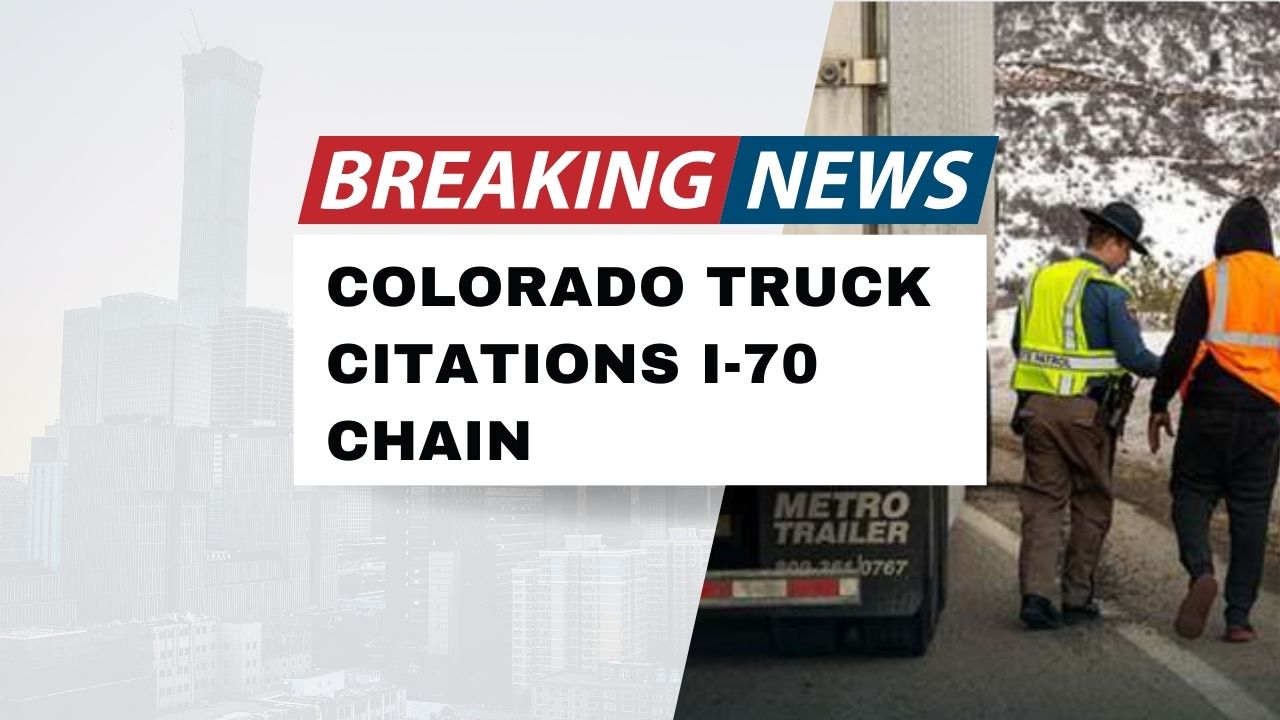What does the colorado truck citations i-70 chain rule mean?
When I first drove across Colorado in the winter, I learned about a rule that was different from other states. The state has something called the colorado truck citations i-70 chain rule. This rule applies to trucks, trailers, and sometimes passenger cars when the road gets icy or snowy. On Interstate 70, which runs through the Rocky Mountains, the weather can change fast. Snow can pile up in minutes, and accidents can happen if vehicles do not have enough traction.
The state requires that certain trucks carry tire chains during the winter season. Tire chains are metal links that go around the tires. They give extra grip on icy roads. If a trucker does not follow the rule, they can receive a ticket. The fine can be very high. I have read that drivers can be charged hundreds of dollars for not carrying chains or not putting them on when told.
The rule exists to keep the highway safe. I-70 is one of the busiest roads in Colorado. Thousands of cars and trucks travel it daily. If one truck gets stuck, it can close the road for hours. That is why the rule is taken very seriously.
| Item | Details |
|---|---|
| Law Active Dates | September 1 – May 31 every year |
| Affected Route | Interstate 70 (I-70) through the Rocky Mountains |
| Key Passes Covered | Vail Pass (10,666 ft), Eisenhower Tunnel (11,158 ft) |
| Trucks Required to Chain | All commercial trucks traveling on I-70 |
| Fine for Not Carrying Chains | About $50 + $17 surcharge |
| Fine for Not Using Chains When Required | About $500 + $79 surcharge |
| Fine if Truck Blocks Road Without Chains | About $1,000 + $157 surcharge |
| Minimum Chains Required (Level 2 Law) | Chains on 4 drive wheels |
| Average Annual Closures on I-70 | 100+ hours lost from vehicles without chains |
| Chain-Up Stations | Dozens located near major passes and exits |
Why is the chain law needed on I-70 in Colorado?
When I asked local drivers about the law, they told me that the mountains create unique problems. The colorado truck citations i-70 chain law was made because this road goes over steep mountain passes. Roads like Vail Pass and Eisenhower Tunnel reach more than 10,000 feet above sea level. At this height, snow and ice are common even in early fall and late spring.
Without chains, trucks slide on the steep grades. A single semi-truck can block the entire road if it loses control. I once saw a traffic alert where one truck without chains caused a line of cars that lasted for hours. This not only delayed people but also put many at risk.
The chain law is about safety for everyone. It reduces crashes, protects cargo, and keeps emergency services from being overwhelmed. Drivers of small cars often feel safer when big trucks follow the rule. The Colorado Department of Transportation (CDOT) updates road signs to tell drivers when the law is active. That way, no one can say they did not know.
When does the chain law apply for truck drivers?
I remember being surprised when I learned how long the season lasts. The colorado truck citations i-70 chain law is in effect every year from September 1 to May 31. This means drivers must always be ready during that time. Even if the weather looks sunny at the start of a trip, storms can appear without warning.
There are different levels of the law:
- Level 1: This applies to single-axle trucks. These trucks must have chains when conditions are poor.
- Level 2: This is the most common. All commercial trucks must put chains on at least four drive wheels.
For smaller cars, there is something called the passenger vehicle traction law. That means cars must have snow tires, all-wheel drive, or chains.
The chain law is only enforced when the road is snowy or icy. Digital signs across I-70 warn drivers about chain-up areas. Truck stops also have signs and space for drivers to install chains safely. I saw one trucker explain online that he always carries extra chains to avoid a costly fine.
What are the fines for breaking the chain law?
The colorado truck citations i-70 chain law has strict fines. I remember reading about a truck driver who was charged more than $1,000 in penalties for not following the rules. The fines depend on what the driver did wrong.
Here are the common amounts:
- If a truck driver does not carry chains during the season, the fine can be around $50 plus extra charges.
- If a driver fails to put chains on when required, the fine can go up to about $500 plus surcharges.
- If a truck blocks the road because it did not have chains, the fine can reach more than $1,000.
These numbers may seem high, but the state uses them to remind drivers how serious the rule is. When a single truck blocks I-70, it can cost the economy thousands of dollars in lost time. Skiers, tourists, and delivery trucks all rely on the road being open.
That is why most truck drivers plan ahead. They often keep spare chains, gloves, and lights in their truck to avoid penalties.
How do drivers prepare for chain law season?
When I spoke with a driver at a rest stop, he told me that preparation is key. The colorado truck citations i-70 chain law is not something to take lightly. Drivers must plan before they start their trip.
Here are some common ways drivers get ready:
- Keep the correct number of chains in the truck.
- Practice putting the chains on before winter.
- Carry warm gloves and a flashlight for night chain-ups.
- Use truck stops that provide safe chain-up areas.
Some drivers even mark their calendar to remind themselves of the start date. I once read on a trucking forum that many drivers keep chains in the truck year-round. That way, they never forget when the season starts.
Preparing early also saves money. Chains can be costly, but they are much cheaper than paying a fine. More than that, chains can prevent accidents that may harm people or damage cargo.
What should tourists and smaller car drivers know?
I remember when I rented a car in Denver and drove toward the mountains. I was surprised to learn that even small cars are included in parts of the rule. The colorado truck citations i-70 chain law has parts that cover passenger vehicles too.
When signs say “Traction Law,” cars must have one of these:
- Snow tires
- Four-wheel drive or all-wheel drive
- Chains or an approved traction device
Rental companies often explain this to tourists. Still, some visitors from warmer states do not expect to need chains. A friend from Texas once told me he was shocked when police stopped cars to check for proper tires.
Tourists who do not follow the rule can be fined. More than that, they risk getting stuck. A small car without traction can slide on icy roads. This can cause crashes or block traffic for hours. That is why even vacation drivers need to plan ahead for winter conditions.
How does the chain law help keep the road open?
The colorado truck citations i-70 chain rule may seem like a burden, but I have seen how it helps. When trucks follow the law, fewer vehicles get stuck on steep mountain passes. That means the road stays open for everyone.
CDOT shares data about closures each year. Many closures are linked to trucks that were not chained up. When drivers follow the rule, closures drop. This saves time for truckers, tourists, and emergency crews.
The law also helps keep freight moving. I-70 is a key route for goods like food, fuel, and construction materials. If trucks cannot move, stores may see empty shelves. Local businesses depend on the road being clear.
In simple words, the rule keeps traffic flowing. It protects people from long waits in cold weather. It gives police and tow trucks fewer problems to solve. That is why many residents support the law even if it feels strict.
What is my advice for anyone driving I-70 in winter?
After learning about the colorado truck citations i-70 chain law and seeing it in action, I have my own advice. If you drive this road in the winter, always be ready. The weather can change in minutes. Clear skies can turn into a snowstorm before you reach the next town.
Here are my tips:
- Always check CDOT road alerts before leaving.
- Keep chains, gloves, and warm clothing ready.
- Stop at chain-up stations to put chains on safely.
- Do not ignore signs, even if the road looks fine.
I believe safety comes first. Paying for chains and taking the time to put them on is far better than risking a fine or crash. Every year, drivers who ignore the law end up in trouble.
My final thought is simple. The chain law is not just about rules. It is about protecting lives, keeping the highway open, and making travel safer for everyone.








